|
Dear Friend,
Last week, I had the opportunity to host the 49th Chancellor’s Council (CC) Annual Meeting & Symposium in Austin. The Chancellor’s Council is made up of some of the most devoted and generous friends of The University of Texas System, and Chairman Larry West and I were pleased to interact with more than 1,000 CC members.
Each year we highlight exceptional leaders and programs to allow Chancellor’s Council members to witness firsthand some of the advancements their generosity helps make possible.
I kicked off the Symposium with remarks on the state of the UT System. You can watch my remarks, but the headline is that while the System is stronger than ever – and getting stronger every day – strength alone is not enough. For us to maximize our impact on Texas and the world – for us to make the kinds of Quantum Leaps I know we are capable of – we must also be nimble, agile, resilient and, most of all, collaborative, not only with our expertise within the UT System but throughout the nation and the world.
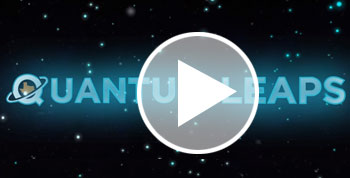
Collaboration was on full display in the three lively and enlightening panel discussions – led by legendary newsman and Texas native Bob Schieffer – that followed my remarks.
In keeping with the theme of the Symposium – Global Challenges, Texas Solutions – each of the panels focused on the role higher education and the UT System, in particular, can and should play in tackling the world’s thorniest problems.
The first panel was called Bridging the Economic Divide and it featured Sara Martinez Tucker (UT System Regent and former Under Secretary at the U.S. Department of Education), Woody Hunt (Executive Chairman of Hunt Companies, Inc. and former chairman of the Texas Higher Education Coordinating Board’s Strategic Planning Committee) and Allan Golston (President of the United States Program of the Bill and Melinda Gates Foundation). The three experts discussed the profound link between education and economic mobility and what more can be done to give every young person a fighting chance for a bright, prosperous future.
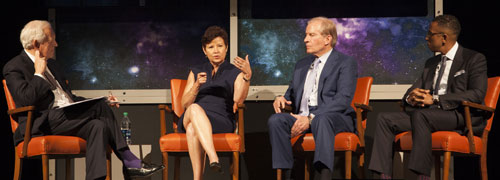
It was inspiring and encouraging to see and hear these three leaders engage with each other and share their insights. It occurred to me that the paths the panelists have taken in their lives are quite different, but all three paths led to the same place and to the conclusion that it is beyond time to find innovative ways to educate the young people upon whose shoulders rests America’s future.
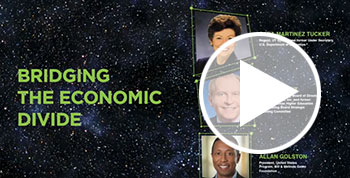
Watch the full panel discussion.
I was honored to be part of the second panel, National Security Takes the Higher (Education) Road, which also included Nick Rasmussen (Director of the National Counterterrorism Center) and Will Inboden (Executive Director, UT Austin Clements Center for National Security). We spoke of the powerful, if too-often underappreciated, role higher education can play in keeping our nation safe and secure.
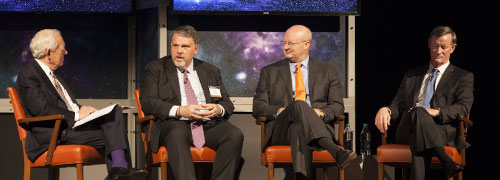
If there is one thing our country has learned over the last 15 years, it is that ideas and knowledge are powerless if they are not shared. Silos can be disastrous, even deadly. This is especially true when it comes to national security. And here the UT System can play an essential role – not just sharing our perspective with the world – but also convening experts from all relevant disciplines. We have the ability – and a duty to our country – to bridge gaps, find common ground and drive understanding and collaboration. That’s what we intend to do and Friday’s panel was but one of many steps we’ve already taken in that direction.
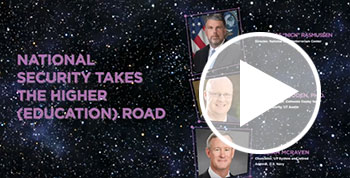
Watch the full panel discussion.
Finally, the Chancellor’s Council heard from three of the brightest lights in the medical world on the panel titled Health Care that Works. Dr. Clay Johnston (founding Dean of UT Austin’s Dell Medical School), Dr. Alexander Vo (Vice President of Telemedicine and Health Services Technology, UT Medical Branch) and Dr. Carmel Dyer (Executive Director, UTHealth Houston Consortium on Aging) discussed some innovations that have the potential to revolutionize medical education and change the way health care is delivered in Texas and around the world.
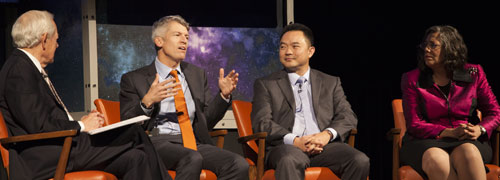
It is hard to think of another field where astounding breakthroughs occur almost daily, and yet practices that have long outlived their usefulness endure. (Dr. Johnston’s favorite example: hospital gowns). Entrenched practices are often sustained by culture and, with two new medical schools about to open, the UT System has a unique, practically unprecedented, opportunity to create a culture unencumbered by the way things have always been done.
But Drs. Vo and Dyer made it clear that health institutions with long histories can be innovators too. I was particularly proud and encouraged to hear how telemedicine from UTMB is making world-class care available to our fellow Texans living in rural areas and how UTHealth, with an increased emphasis on geriatrics, is making Texas a healthier place to grow old.
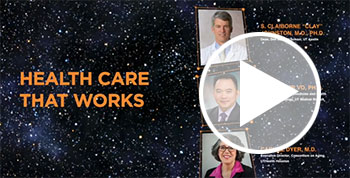
Watch the full panel discussion.
Addressing economic inequality, enhancing national security, improving health care delivery: If these seem like ambitious goals, it’s because they are. And as I said in my remarks Friday, none of our goals will be easy to achieve. If they were easy, someone else would have done them by now. But the fact is, there is nobody else. In this state that we love, there really is no other institution with the depth of talent, the strength or the reach of the UT System.
In some very real ways, the future of Texas is in our hands. Which, of course, makes our loyal network of supporters all that much more important.
I want to thank you for being part of that network. Rest assured, my colleagues and I are going to keep working hard to earn your continued support in the months and years to come.
Respectfully,

Bill McRaven
|